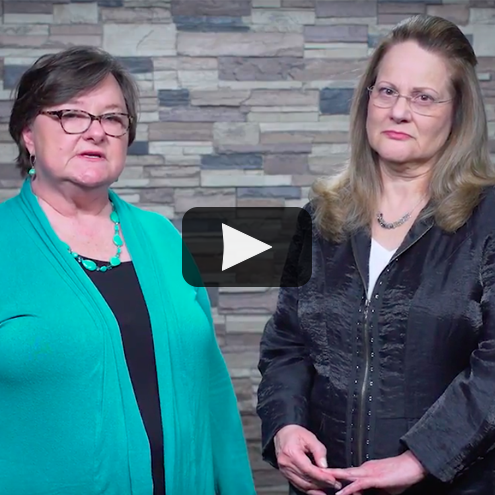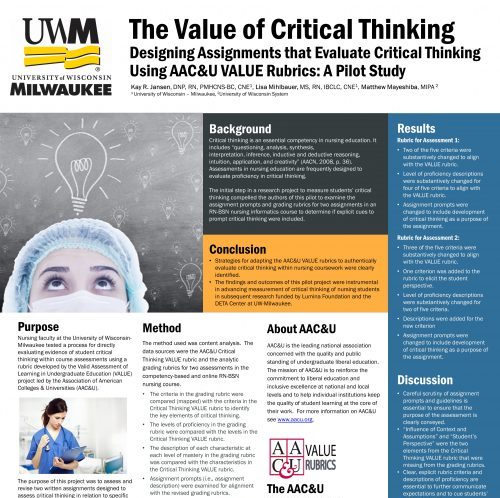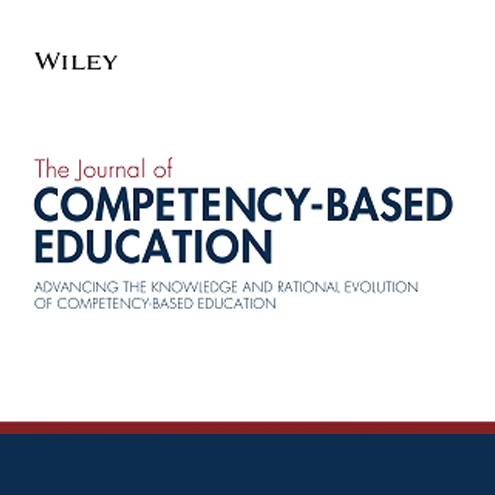Key takeaways
- A high quality curriculum will be led by faculty and grounded in pedagogy that is supported by research and focused on learning outcomes.
Read more...
The UW Flexible Option built credibility by relying on the same UW faculty and staff responsible for the quality of traditional programs to develop competencies and implement assessments for its CBE programs.
As for traditional programs, the faculty and staff are expected to incorporate best practices in learning science. These include writing-intensive assessments, undergraduate research, service learning/community-based learning, and capstone projects—all of which can increase achievement of quality learning outcomes.
An example of how faculty build in higher order thinking skills is discussed by lead nursing faculty in the video below and is illustrated in the poster in the “More detail” section of this page.
Kim Jansen and Lisa Mihlbauer of the University of Wisconsin-Milwaukee College of Nursing explain how UW Flexible Option faculty incorporated critical thinking skills in the RN to BSN degree curriculum.
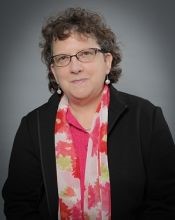 The UW faculty and academic leaders developing the early Flex programs were recognized throughout the UW System and nationally for their work to advance a shared understanding of quality through curricular integrity grounded in essential learning outcomes, high-impact teaching and learning, and inclusive excellence. These were exactly the people we needed to stand up this new academic model.
The UW faculty and academic leaders developing the early Flex programs were recognized throughout the UW System and nationally for their work to advance a shared understanding of quality through curricular integrity grounded in essential learning outcomes, high-impact teaching and learning, and inclusive excellence. These were exactly the people we needed to stand up this new academic model.UW Flex Lumina grant principal investigator Rebecca Karoff, who is an associate vice chancellor in the office of academic affairs for the University of Texas System
- Academic integrity is strengthened through connections to institutional learning standards.
Read more...
The Faculty/Instructional Academic Staff ad hoc committee formed to provide advice in the development of UW Flex noted that the quality of degrees and credentials would rely on rigorous and high-quality competencies and assessments—and the connection to the UW System Shared Learning Goals. These are liberal education goals, such as creative and critical thinking, for University of Wisconsin programs regardless of modality. They continue to provide a framework on which UW Flexible Option competencies are built.
We all recognize our responsibility to do better by our students, to educate
 in a way that broadens skills and develops critical thinking and problem-solving abilities.
in a way that broadens skills and develops critical thinking and problem-solving abilities.Judee Richardson, director of academic and curricular development for UW-Extension, writing about institutions exploring CBE in this commentary for the April 2016 Journal of Competency-Based Education
- Design principles from the LEAP quality framework can be applied to CBE programs such as the UW Flexible Option.
Read more...
General Education Maps and Markers (GEMs) design principles include:
- Proficiency
- Agency and self-direction
- Integrative learning and problem-based inquiry
- Equity
- Transparency/assessment
Created through AAC&U’s LEAP initiative, the principles were designed to frame quality for general education. A Journal of Competency-Based Education white paper on “Designing quality into direct-assessment competency-based education” demonstrates how the principles also apply as a quality framework for competency-based education and provides related recommendations:
- Start at the program level to develop curriculum.
- Engage students early.
- Design problem-solving competencies and rubrics that require the application of skills and knowledge to the real world and assessments that provide opportunities for teamwork in diverse settings.
- Move CBE curricula toward degrees that are earned through demonstrated mastery of broad and specific skills and abilities.
- Clearly identify the CBE program target audience and provide onboarding to help students succeed in that or other program formats that best meet their needs.
 The best CBE programs will design competencies that articulate the skills and abilities needed by productive citizens, and evaluate mastery of those competencies through assessments that blend seamlessly into students’ work and family.
The best CBE programs will design competencies that articulate the skills and abilities needed by productive citizens, and evaluate mastery of those competencies through assessments that blend seamlessly into students’ work and family.UW-Extension Provost Aaron Brower writing in his Navigating the CBE Frontier series for The evolllution
Challenges
- Stakeholders often assume that CBE quality will be lower than that of traditional educational models.
Read more...
UW Flex early response: Higher education regulators and accreditors view CBE models as equal to traditional models and are building more rigor into program evaluation and approval. Some other stakeholders—such as academic department heads, deans, provosts, chancellors, and some peers at other institutions—assume that degree credibility comes only with credit hour and time-based programs.
The American Enterprise Institute Center on Higher Education Reform reported on “Employer Perspectives on Competency-Based Education” in April 2015. This research found low awareness of CBE among the majority of employers surveyed; however, the minority who were previously aware of CBE expressed favorable opinions of CBE and graduates of CBE programs. In this low-information environment, a respected higher education institution may benefit from the brand built by its more traditional programs. Employers and students’ perceived value of the University of Wisconsin brand contributed to positive perceptions of the UW Flexible Option even before a track record could be established.
In addition, UW Flex senior leaders sought opportunities to clarify misconceptions through:
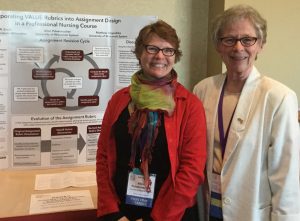
Alice Pulvermacher of UW System and Diane Smith of UW-Milwaukee explain the process for incorporating critical thinking into nursing curriculum at an AAC&U conference. - Participation in the national dialogue about CBE and academic quality and rigor, from professional conferences and journals to the popular press. (See the poster shown, at left, about incorporating AAC&U VALUE rubrics into assignment design.)
- Legislative briefings and other meetings with policy-makers
- Engaging faculty members as early adopters and advocates among their peers
- Creation of University of Wisconsin ad hoc advisory committees
- Multiple forms of internal communications with governance groups, faculty, staff, and the UW Board of Regents both to allay concerns and manage expectations
- Development of research methodology to compare student outcomes for CBE and traditional programs (see “Looking forward from 2017” section below)
The American Institutes for Research (AIR) provides further support that “CBE programs appear to be on the path to fulfilling their value propositions” in the October 2016 report “On the Path to Success: Early Evidence About the Efficacy of Postsecondary Competency-Based Education Programs.”
Looking forward from 2017: The AIR report referenced above also discusses the need for valid comparisons of student outcomes for those in CBE programs with those in comparable traditional programs.
One pilot study compared UW Flexible Option students and students in a parallel traditional online course. Findings, which have been submitted for publication in a peer-reviewed journal, indicate that UW Flex student outcomes are comparable with those of students in the traditional course. However, the population studied was small, warranting further research for conclusive evidence. UW Flex leaders look forward to continued and robust analyses of this program quality question.
The UW will continue to work closely with its regional accreditor and with the U.S. Department of Education to ensure that its programs meet all state and federal requirements for excellence and rigor.
In addition, efforts to create quality frameworks for competency-based education programs include an aspirational model based on the AAC&U LEAP design principles and outlined in “Designing quality into direct-assessment competency-based education” published by the Journal of Competency-Based Education in May 2017, Quality Principles and Standards for Competency-Based Programs released by the Competency-Based Education Network in May 2017, and the common framework for defining and approving CBE programs developed by the Council of Regional Accrediting Commissions in 2015.
- Resources are needed to support the rigorous review required to ensure program quality.
Read more...
UW Flex early response: Quality and substance depend on setting high performance standards and undergoing rigorous academic review by the institution and by accreditors and other regulatory agencies. This entails defining and measuring quality and requires adequate resources. This issue also is addressed in the Policy content area of this website. UW Flex senior leaders have reallocated resources as needed for external review by regulators and accreditors and as scheduled for internal review of a third of the curriculum per year. Both are rigorous evaluations of the curriculum and pedagogy.
UW Flex leaders also developed the UW Flexible Option Metrics Framework, which has not yet been fully implemented, and began developing the Student Engagement System, focusing first on enrollment management needs. This comprehensive student records system eventually will compile information about students throughout their engagement with UW Flex from initial inquiry to post-graduation.
Looking forward from 2017: Resources will continue to be allocated to ensure that UW Flex monitors and maintains program quality. This includes through the UW Flexible Option Metrics Framework, which will be used for continuous improvement, and the Student Engagement System, which will be used to track metrics, monitor program quality, and make appropriate adjustments.
One of the nine components of the Student Engagement System is an alumni tool. For that tool, UW Flex staff in 2017 began developing a survey instrument to administer to students who have left UW Flex since the January 2014 launch. Survey results will help staff standardize the ongoing and routine collection and analysis of data. UW Flex staff will use the data for continuous improvement of the student experience, student outcomes, and UW Flex program delivery.
